A Professor of British Cinema and prominent researcher is celebrating 50 years as a member of academic staff at DMU.
Steve Chibnall made his first foray into teaching at DMU’s precursor, Leicester Polytechnic, in 1974 when he joined a small band of sociologists teaching on various degree courses.
Since then, Steve has published and contributed to many books, numerous research papers and taught thousands of students at DMU across several subjects.
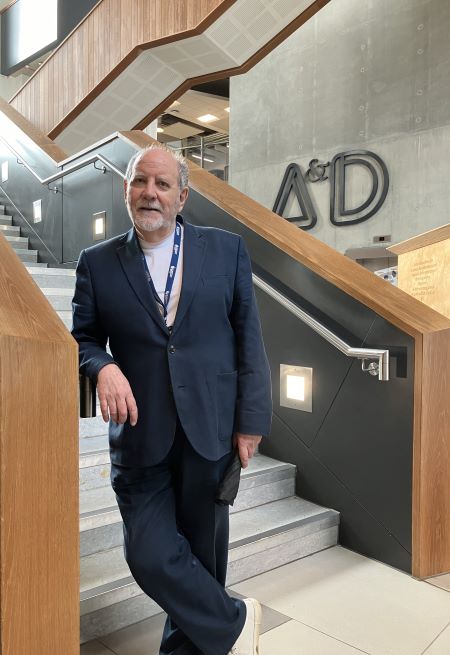
Steve in the Design Wing of the Vijay Patel Building
Steve, who is currently Professor of British Cinema and Visual Culture and dedicates all of his time to research, said: “These days, when so many people seem to change jobs nearly as often as they change their underwear, it might seem extraordinary that I could stay in the same job for half a century.
“But the truth is, although I have had the same employer, I’ve had a great variety of jobs.
“I have taught students in many different subject areas in many different buildings. I’ve had at least eight office moves and regularly changed the focus of my research.
“I’m grateful to DMU for facilitating these changes and enabling me to progress from a novice lecturer to a research professor. But most of all for allowing me enough time to pursue my research obsessions: to uncover that which has been unjustly or unaccountably ignored.
“For me, investigative research is not so much a job as a vocation that I would be compelled to follow even if I were not employed.
“But I’m happy to say that I still am employed and can continue to make a contribution to the ever-evolving research culture at DMU, and continue to work with colleagues in creative partnerships.”
1970s
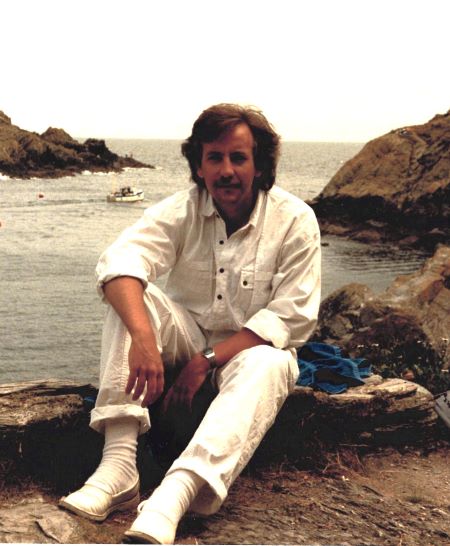
Steve in Cornwall in the 1970s
In 1974, Steve was still working on his doctorate at Essex University about crime reporting in the British press when he joined Leicester Polytechnic.
During those early days, he was teaching law and public administration students while completing a book based on his PhD, ‘Law-and-Order News’ (Tavistock, 1977). The book became a best-seller for a research monograph, selling 7,500 copies in hardback and paperback, and is still regarded as a classic text.
1980s
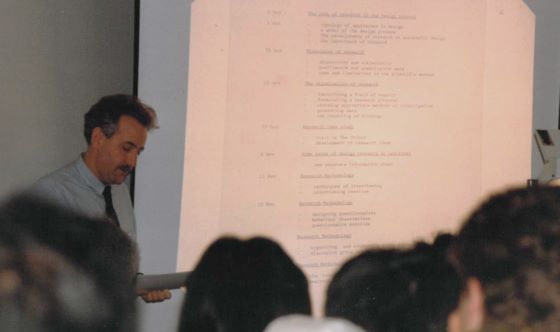
Steve lecturing in the 1980s
In 1981, with his doctorate completed, Steve took on the challenge of teaching design students at both undergraduate and master’s level, offering a BA module on popular culture and social change and consultation on research methods to graphic, contour, interior and industrial design postgraduates.
His research interests shifted to American influences on British culture, and he published in the cutting-edge History Workshop Journal and the influential popular journal, New Society, where he explored spivs, jukeboxes and the idea of post-modern television.
Steve said: “I was very much at home in the art and design environment and delighted to discover so many students with a burning enthusiasm for their subjects.”
At this time Steve also made a name on the cricket field as an opening batsman and slow bowler for Leicester Academicals, a Leicester Poly team which he sometimes captained.
But, more significantly, he began to amass and curate a private collection of popular culture books, magazines and artefacts.
1990s
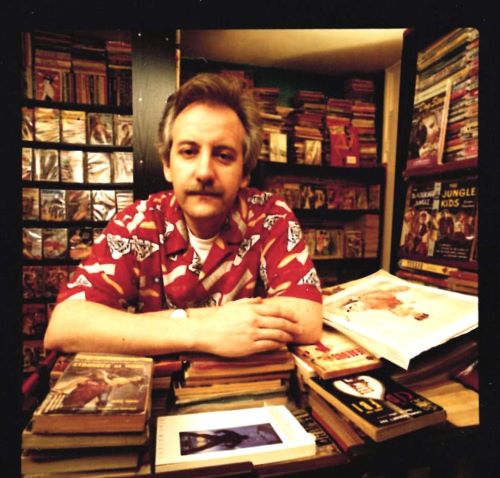
Steve with part of his extensive British cinema collection in the 1990s
With the conferral of university status in 1992 – when Leicester Polytechnic became De Montfort University – there was a refreshed interest in research and Steve joined the team developing a new degree in Media Studies.
At first, he taught cultural studies - including a pioneering model on paperbacks and magazines, based partly on his own collection - but steadily gravitated to film studies while co-founding the now nearly thirty-year-old Journal of British Cinema and Television.
In the late 90s, Steve also secured a role as co-editor, with fellow DMU academic Ian Hunter, of a Routledge series of original anthologies on British cinema genres.
In this period Steve also organized and curated a couple of festivals at the Pheonix in Leicester on British exploitation films [1995] and radical films in Britain in 1968 [1998]. It was at the latter event that he first made contact with the radical film-maker and artist, Peter Whitehead - an association which would lead to the donation of Whitehead’s archive to DMU and a continuation of Steve’s championing of public engagagement.
2000s
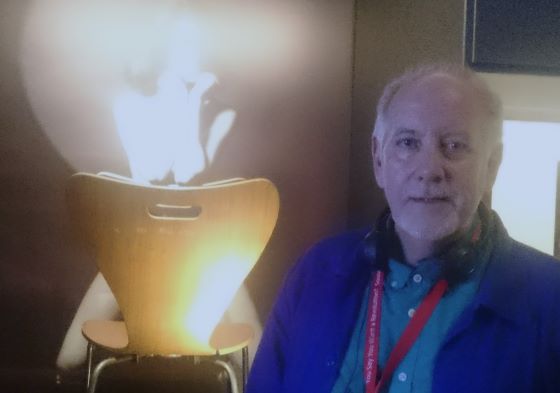
Steve in front of the famous picture of Christine Keeler plus the chair used for the original photo
Steve’s engagement and impact activities expanded after the millennium, when the demand for his contribution to video/DVD booklets and on-screen ‘extras’ took off. To date he has contributed creative pieces to more than thirty releases from seven companies, and images from his British cinema memorabilia collection to many more. He has also accepted a number of invitations from the BBC to contribute to television and radio documentaries and is a regular on BBC Radio’s Screenshot podcast.
As Visiting Professor at London’s Cinema Museum, Steve curated and often acted as interviewer for ‘Cine Sisters’, a series of on-stage career interviews with female veterans of the British screen industries.
As co-curators of the Peter Whitehead Archive, Steve and Alissa Clarke were invited to curate a season of five stage and screen events at London’s Royal Albert Hall in 2017 to celebrate the 50th anniversary of the ‘Summer of Love’.
This was followed by three similar public events at London’s Regent Street Cinema in 2018.
Steve has developed a keen interest in exhibition curation, evidenced in his innovative ‘Scandal ’63 Revisited’ exhibition (2023) at DMU’s Leicester Gallery, which was named ‘Exhibition of the Week’ by The Guardian.
After loaning artefacts to Leicester Museum’s ‘award-winning Mods and Punk exhibitions, he has now joined the steering committee for the organisers’ new public engagement company, ‘The Social Gallery’.
Steve played a leading role in establishing Film Studies as a joint and then a single honours course at DMU and oversaw the creation in 2010 of the Cinema and Television History (CATH) Research Centre.
Steve has been active in acquiring archival donations to the research centre and has had notable successes with, for example, Hammer Films’ script archive, the Sir Norman Wisdom Collection and the production files of Palace Pictures.
He said: “I see archives as not only a way of giving research institutes a distinctive flavour and attracting postgraduate students, but also providing a platform for engagement events, such as the film festival that accompanied the acquisition of the Hammer archive.”
Steve was Director of the CATH Research Centre for nine years before handing over to Professor Justin Smith when it became a research institute. He no longer teaches undergraduates but remains highly active as a researcher and research administrator
Beyond film studies, Steve has played a role in bringing the Andrew Logan and Zandra Rhodes archives to DMU’s Special Collections.
Posted on Thursday 26 September 2024